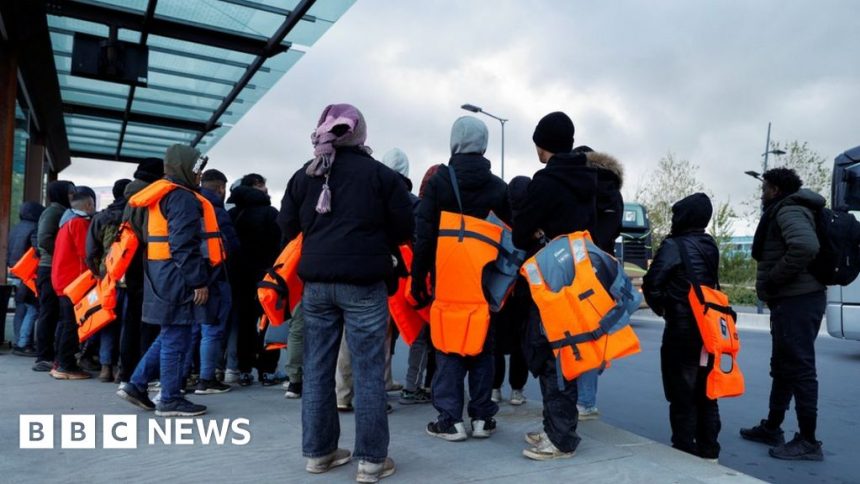Migrants undeterred by deaths to continue Channel crossing attempts
-
Published
The BBC’s Andrew Harding witnesses people clambering aboard a small boat bound for the UK
The wind, which picked up during the day on Tuesday and made it impossible for small boats to attempt more Channel crossings, now looks to be easing. Already, around Calais, there are indications that, despite yesterday’s deaths, smugglers are starting to shepherd migrants towards the dunes along the coast to prepare for more launches.
We saw a group of Vietnamese, who have recently begun arriving in northern France in large numbers, setting off by bus. The French police estimate that the Vietnamese, many of whom appear to be escaping debts to gangsters at home, now make up 20% of all those attempting to cross the Channel.
In the seaside resort town of Wimereux, locals have been digesting the news that 10 people have now died on their beaches this year, with five drowning off a slipway in January, and five more now dying in the waters off a long beach near the golf course north of the town.
“The British are the ones responsible,” said the Mayor of Wimereux, Jean-Luc Dubaele, on French television. He’d previously told the BBC he believed that the UK needed to tighten its employment regulations since it was the prospect of finding work there that he believed lured so many people into attempting the crossing.
Three suspected smugglers who’d been on the overcrowded boat on Tuesday have now been arrested in the UK. They’d continued their journey despite the deaths and reached British waters several hours later.
But there’s no indication that the arrests, or the deaths, will have any significant impact on the smugglers’ operations here in France. We’ve spoken to a number of prospective migrants, and to one UK-based leader of a smuggling network, who all said that it remained, in effect, business as usual.
“The boats are good quality. When the sea is calm it’s easy,” shrugged Noorislam, a 27-year-old from Afghanistan. He’s been in Calais for a year and said he’d made 10 failed attempts to cross the Channel, each time being thwarted by French police.
The smuggling boss, who spoke to a BBC colleague – a Syrian – by phone, believing he was a migrant looking for a seat on one of his boats, insisted there was nothing to fear.
“Don’t worry. There’s no danger at all. As soon as you’re in the boat, call the coast guard. They will escort you,” said the smuggler. He also dismissed the threat of deportation from the UK to Rwanda.
“Don’t worry about this Rwanda issue. It is kaput,” he claimed.
French and British police are investigating what happened before dawn on Tuesday, but it is already clear that the main cause of the deaths was a dangerously overcrowded boat, which two separate groups of migrants attempted to board.
We were on the beach when it happened, and despite the chaos and the darkness, it was clear that as one main group of migrants emerged from the dunes and charged towards the sea, dragging their inflatable boat with them, a second group suddenly joined them from further south. This second group had no boat of their own, and appeared, to us, to be acting on the spur of the moment, presumably hoping to catch a ride on the other group’s inflatable.
Was there fighting inside the boat between the different, and presumably rival groups? It was impossible to tell what was happening just offshore in the half-light. There were some screams and shouts, and it was clear the boat was dangerously overloaded.
Did the smugglers clash violently over who should be allowed onboard? Or did the five who died, including a seven-year-old Kurdish girl, simply fall victim to an already chaotic situation, with twice as many people as usual all scrambling for a spot on a crowded boat?
News of the deaths spread quickly through the migrant communities waiting in their makeshift camps near Calais, Boulogne and Dunkirk. As we spoke to one group of Eritreans, someone – presumably a smuggler – threw a stone at us in an attempt to prevent us talking. It is clear that the smugglers use violence, or at least threats of violence, to keep their paying clients in line.
“We’re not scared. If we’re to die in the Channel, that’s what God wanted. It is nothing compared to what we’ve already been through,” said one Eritrean man.
The French police continue to defend their handling of such incidents. They point to growing evidence of violence from the smugglers, such as we witnessed on Tuesday, which makes it increasingly difficult to intervene without making the situation even more dangerous.
-
-
Published3 hours ago
-






